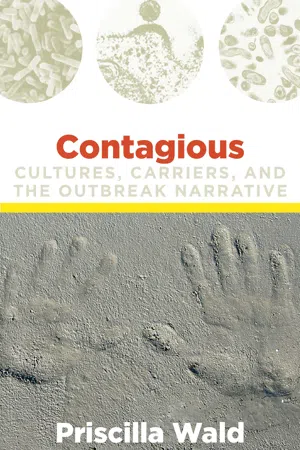
a John Hope Franklin Center Book
Cultures, Carriers, and the Outbreak Narrative
- English
- PDF
- Available on iOS & Android
About This Book
How should we understand the fear and fascination elicited by the accounts of communicable disease outbreaks that proliferated, following the emergence of HIV, in scientific publications and the mainstream media? The repetition of particular characters, images, and story lines—of Patients Zero and superspreaders, hot zones and tenacious microbes—produced a formulaic narrative as they circulated through the media and were amplified in popular fiction and film. The "outbreak narrative" begins with the identification of an emerging infection, follows it through the global networks of contact and contagion, and ends with the epidemiological work that contains it. Priscilla Wald argues that we need to understand the appeal and persistence of the outbreak narrative because the stories we tell about disease emergence have consequences. As they disseminate information, they affect survival rates and contagion routes. They upset economies. They promote or mitigate the stigmatizing of individuals, groups, locales, behaviors, and lifestyles.
Wald traces how changing ideas about disease emergence and social interaction coalesced in the outbreak narrative. She returns to the early years of microbiology—to the identification of microbes and "Typhoid Mary, " the first known healthy human carrier of typhoid in the United States—to highlight the intertwined production of sociological theories of group formation ("social contagion") and medical theories of bacteriological infection at the turn of the twentieth century. Following the evolution of these ideas, Wald shows how they were affected by—or reflected in—the advent of virology, Cold War ideas about "alien" infiltration, science-fiction stories of brainwashing and body snatchers, and the HIV/AIDS pandemic. Contagious is a cautionary tale about how the stories we tell circumscribe our thinking about global health and human interactions as the world imagines—or refuses to imagine—the next Great Plague.
Frequently asked questions
Information
Table of contents
- Contents
- Acknowledgments
- Introduction
- 1 Imagined Immunities: The Epidemiology of Belonging
- 2 The Healthy Carrier: ‘‘Typhoid Mary’’ and Social Being
- 3 Communicable Americanism: Social Contagion and Urban Spaces
- 4 Viral Cultures: Microbes and Politics in the Cold War
- 5 ‘‘The Columbus of AIDS’’: The Invention of ‘‘Patient Zero’’
- Epilogue
- Notes
- Works Cited
- Index